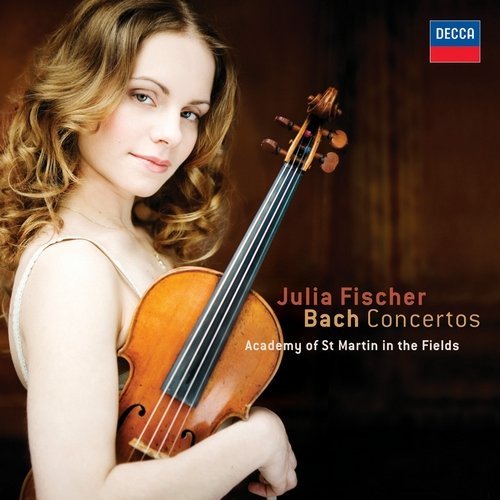
Julia Fischer - Bach Concertos (2009)
BAND/ARTIST: Julia Fischer
- Title: Bach Concertos
- Year Of Release: 2009
- Label: Decca
- Genre: Classical
- Quality: FLAC (tracks+.cue,log)
- Total Time: 58:44
- Total Size: 322 Mb
- WebSite: Album Preview
Tracklist:
01. Concerto for two violins in D minor, BWV.1043: 1.Vivace (3:28)
02. Concerto for two violins in D minor, BWV.1043: 2.Largo ma non tanto (6:41)
03. Concerto for two violins in D minor, BWV.1043: 3.Allegro (4:40)
04. Concerto for violin in A minor, BWV.1041: 1.(Allegro moderato) (3:27)
05. Concerto for violin in A minor, BWV.1041: 2.Andante (6:22)
06. Concerto for violin in A minor, BWV.1041: 3.Allegro assai (3:35)
07. Concerto for violin in E major, BWV.1042: 1.Allegro (7:15)
08. Concerto for violin in E major, BWV.1042: 2.Adagio (6:38)
09. Concerto for violin in E major, BWV.1042: 3.Allegro assai (2:36)
10. Concerto for Oboe, violin in C minor, BWV.1060: 1.Allegro (4:57)
11. Concerto for Oboe, violin in C minor, BWV.1060: 2.Adagio (5:31)
12. Concerto for Oboe, violin in C minor, BWV.1060: 3.Allegro (3:34)
01. Concerto for two violins in D minor, BWV.1043: 1.Vivace (3:28)
02. Concerto for two violins in D minor, BWV.1043: 2.Largo ma non tanto (6:41)
03. Concerto for two violins in D minor, BWV.1043: 3.Allegro (4:40)
04. Concerto for violin in A minor, BWV.1041: 1.(Allegro moderato) (3:27)
05. Concerto for violin in A minor, BWV.1041: 2.Andante (6:22)
06. Concerto for violin in A minor, BWV.1041: 3.Allegro assai (3:35)
07. Concerto for violin in E major, BWV.1042: 1.Allegro (7:15)
08. Concerto for violin in E major, BWV.1042: 2.Adagio (6:38)
09. Concerto for violin in E major, BWV.1042: 3.Allegro assai (2:36)
10. Concerto for Oboe, violin in C minor, BWV.1060: 1.Allegro (4:57)
11. Concerto for Oboe, violin in C minor, BWV.1060: 2.Adagio (5:31)
12. Concerto for Oboe, violin in C minor, BWV.1060: 3.Allegro (3:34)
Only months after Deutsche Grammophon released Anne-Sophie Mutter's recording of Bach's violin concertos, Decca released Julia Fischer's recording of the same pieces. The similarities between the two discs run deeper than merely their shared repertoire. Both labels are branches of Universal Music Group and both violinists are individualistic German women, though Mutter is currently at the peak of her career while Fischer is just a bit past starting out. The differences, however, are likewise remarkable. The Deutsche Grammophon disc includes the world premiere of a new work by Sofia Gubaidulina dedicated to the violinist, while the Decca disc includes the more conventional coupling of Bach's Concerto for violin and oboe in C minor, BWV 1060.
But, of course, the most striking difference between the discs is Mutter and Fischer's very different performance styles. Mutter's approach to Bach, like her approach to everything, is wholly modern with plenty of vibrato, portimento, and glissando, plus a very flexible sense of tempo rubato, particularly in the cadenzas. Fischer's approach to Bach is also essentially modern but tempered by historically informed performance practice, that is, with vibrato used only at the top of swells, few traces of portimento or glissando, and a tighter sense of tempo plus a stronger feeling for rhythm. Furthermore, while Mutter's attack is firmer, her tone more commanding, and her phrasing more sculptured, Fischer's attacks are smoother, her tone more insinuating, and her phrasing more seductive. Both players' interpretations are highly expressive, though Mutter's tends toward the overtly dramatic, while Fischer's leans toward the intimately lyrical.
In the end, it's as hard to imagine Mutter's fans taking to Fischer's disc as it is Fischer's fans taking to Mutter's disc. Longtime listeners may want to sample both and may ultimately end up heading back to Arthur Grumiaux's 1978 recording for a purer but no less expressive set of performances. It should be noted that Fischer is accompanied by the now conductorless Academy of St. Martin-in-the-Fields, which proves no less excellent an ensemble for that deficit, and that Decca's digital sound is more discrete but no less present than Deutsche Grammophon's.
But, of course, the most striking difference between the discs is Mutter and Fischer's very different performance styles. Mutter's approach to Bach, like her approach to everything, is wholly modern with plenty of vibrato, portimento, and glissando, plus a very flexible sense of tempo rubato, particularly in the cadenzas. Fischer's approach to Bach is also essentially modern but tempered by historically informed performance practice, that is, with vibrato used only at the top of swells, few traces of portimento or glissando, and a tighter sense of tempo plus a stronger feeling for rhythm. Furthermore, while Mutter's attack is firmer, her tone more commanding, and her phrasing more sculptured, Fischer's attacks are smoother, her tone more insinuating, and her phrasing more seductive. Both players' interpretations are highly expressive, though Mutter's tends toward the overtly dramatic, while Fischer's leans toward the intimately lyrical.
In the end, it's as hard to imagine Mutter's fans taking to Fischer's disc as it is Fischer's fans taking to Mutter's disc. Longtime listeners may want to sample both and may ultimately end up heading back to Arthur Grumiaux's 1978 recording for a purer but no less expressive set of performances. It should be noted that Fischer is accompanied by the now conductorless Academy of St. Martin-in-the-Fields, which proves no less excellent an ensemble for that deficit, and that Decca's digital sound is more discrete but no less present than Deutsche Grammophon's.
As a ISRA.CLOUD's PREMIUM member you will have the following benefits:
- Unlimited high speed downloads
- Download directly without waiting time
- Unlimited parallel downloads
- Support for download accelerators
- No advertising
- Resume broken downloads


